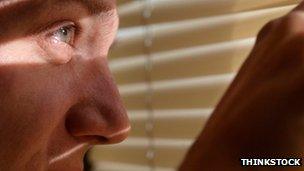Private detectives to need licence
- Published

The Home Office says it wants to combat rogue investigators
Operating as an unlicensed private detective is to be illegal in England and Wales, the home secretary has said.
The Home Office said it wanted to "ensure rigorous standards" in an industry where "rogue investigators" had been infringing privacy.
Those who break the new rules - to be rolled out from autumn 2014 - could face up to six months in jail.
MPs earlier said police had linked 100 firms or individuals to investigators who had obtained information illegally.
Lawyer Kate McMahon: "We use them [private investigators] on almost every case we have"
Blagging
Anyone can currently set themselves up as a private investigator, regardless of their skills or even criminal convictions.
But under the Home Office's plans, investigators will be licensed by the Security Industry Authority after completing a training course and passing a criminality check.
The new regulations do not extend to investigations carried out in relation to publishing legitimate journalism.
Home Secretary Theresa May said: "It is vital we have proper regulation of private investigators to ensure rigorous standards in this sector and the respect of individuals' rights to privacy.
"That is why I am announcing today the government's intention to regulate this industry, making it a criminal offence to operate as a private investigator without a licence.
"Anyone with a criminal conviction for data protection offences can expect to have their application for a licence refused."
Firms could be barred from being licensed if they have been involved in offences including:
Unlawful interception of communications, such as phone hacking
Accessing data on computers without permission
Gathering personal details by posing as someone else, such as blagging information from a call centre
Bribery
The Home Office said that all contractors would need to be licensed and the maximum penalty for failing to comply with the new rules would be six months in jail.
'In the shadows'
Tony Imossi, president of industry body the Association of British Investigators said the proposals were a "good start" but did not go far enough.
The move was welcomed as a "positive step" towards protecting people from unwanted surveillance by privacy campaigners.
"For too long private investigators have been allowed to operate in the shadows," Big Brother Watch director Nick Pickles said.
It comes as pressure mounts on the Serious Organised Crime Agency (Soca) to release the names of more than 100 companies and individuals potentially linked to rogue private investigators who were convicted of obtaining information illegally.
The Home Affairs Select Committee has published a breakdown by business sector of clients linked to the jailed investigators, but has not named them individually.
Chairman Keith Vaz said the identities of the firms and individuals had been held back from the report so as not to "compromise" any investigations by the police or information commissioner.
Eight of the clients on the list were used as evidence in prosecutions under Operation Millipede, an investigation that led to the conviction of four private detectives for fraud last year. A further 94 were judged as potentially relevant to the case, but not used as evidence.
"When we publish our report into private investigators, we would like to be in a position where we publish the entire list," the Labour MP added.
Meanwhile Nick Clegg, the deputy prime minister, said: "I have a lot of sympathy with those who say, if there are big companies and organisations that are using private investigators to find information about individuals and organisations, they should be open about it."
The clients include 22 law firms, financial services and insurance firms, accountants and two celebrities.
- Published31 July 2013